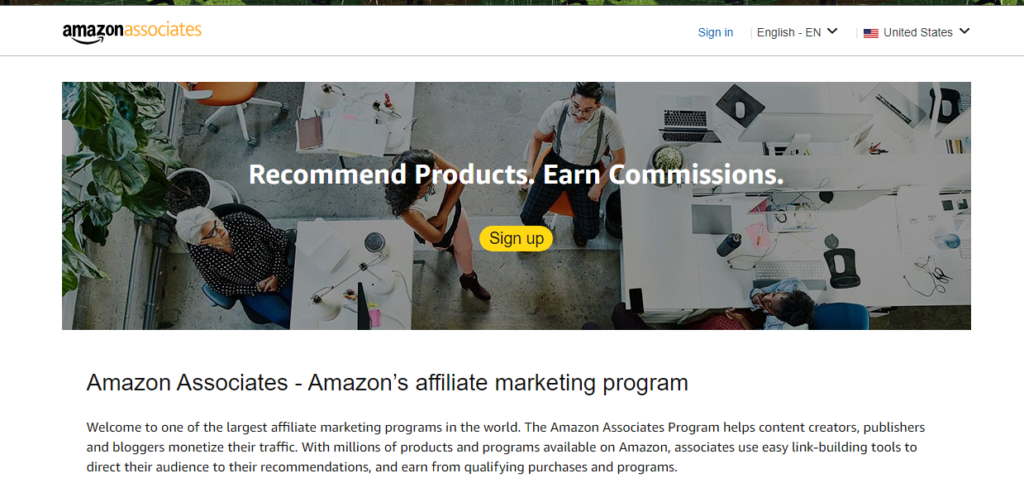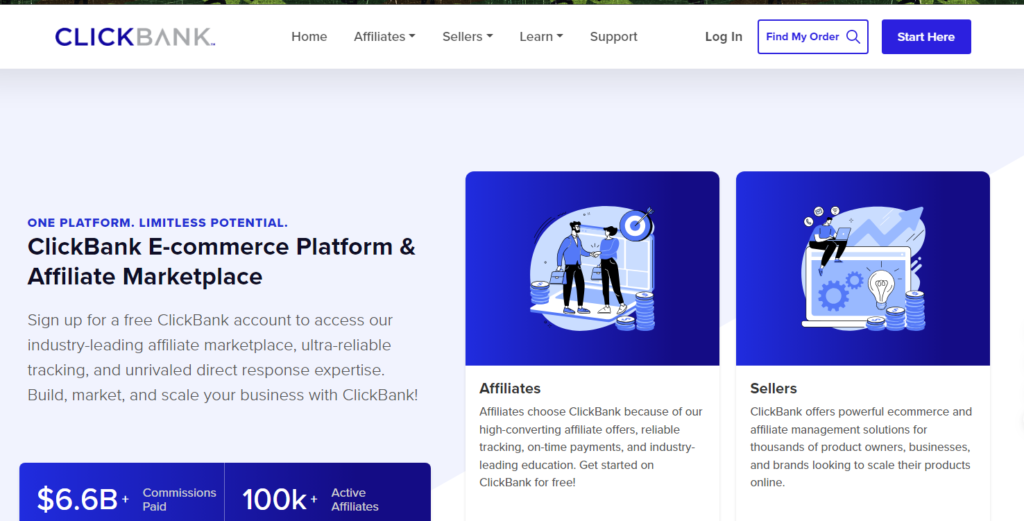Introduction to Affiliate Marketing
Affiliate marketing is a performance-based marketing strategy where individuals, known as affiliates, promote products or services offered by merchants in exchange for a commission on sales generated through their marketing efforts. This process involves three primary parties: the merchant, the affiliate, and the consumer. The merchant provides products or services and earns revenue through sales, while the affiliate acts as an intermediary, sharing the merchant’s offerings with a broader audience. Ultimately, the consumer benefits from discovering products that meet their needs, making affiliate marketing a mutually beneficial arrangement.
How is it done?
The mechanics of starting affiliate marketing are relatively straightforward. Affiliates sign up for an affiliate program provided by merchants, gaining access to unique tracking links. They utilize these links to promote the products across various digital channels, such as blogs, social media, or email marketing campaigns. When a consumer clicks on the affiliate’s link and makes a purchase, the sale is tracked, and the affiliate earns a predetermined commission based on the sale amount. This creates a streamlined process for all parties involved, solidifying the role of affiliate marketing in the online business ecosystem.
For beginners exploring how to start an affiliate marketing business, this model offers numerous advantages:
1. It has low initial investment costs compared to traditional business setups, as affiliates don’t need to create their products.
2. Flexibility – Affiliate marketing for beginners offers flexibility, as affiliates can manage their time and workload according to their preferences.
3. Passive Income– The potential for passive income is significant; once established, affiliates can continue to earn commissions from past promotional efforts.
4. Generating income online—Affiliate marketing is an appealing avenue for generating income online, attracting many individuals who seek to leverage their online presence for profit.
For more insights, check this guide, “Start Affiliate Marketing like a Pro.”
Understanding Affiliate Marketing Terminology

Understanding the fundamental terminology associated with affiliate marketing is crucial for effectively navigating the landscape of this domain. This knowledge will not only help beginners grasp key concepts but also empower them as they begin their affiliate marketing journey.
- Commission – One of the most important terms is “commission,” which refers to the payment an affiliate receives for promoting a product or service. Commissions typically vary in percentage based on the sales generated through the affiliate’s marketing efforts. Understanding commissions is crucial for anyone interested in starting an affiliate marketing business, as it directly affects potential earnings.
- Conversion– Another crucial term is “conversion,” which measures the effectiveness of marketing efforts by indicating how many visitors complete a desired action, such as making a purchase. A higher conversion rate signifies a successful campaign, while a lower rate may require further analysis and optimization.
- The “click-through rate” (CTR) is another important metric that reflects the percentage of users who click on affiliate links compared to the total number of impressions. A high CTR indicates that the marketing strategy is resonating with the audience, which is essential knowledge for affiliate marketing beginners aspiring to improve their promotional tactics.
- “Traffic” refers to the number of visitors directed to a website or a specific URL through various sources, including search engines and social media, and is crucial for establishing a successful affiliate marketing strategy. Additionally, “affiliate networks” refer to platforms that connect advertisers with affiliates, providing tools for managing and tracking affiliate relationships. Examples: Impact.com, JVZoo, etc. Understanding these terms lays a solid foundation for anyone looking to delve deeper into affiliate marketing and comprehend further resources and discussions in this dynamic field.
Choosing the Right Niche
One of the most crucial first steps in starting affiliate marketing is selecting a profitable niche. A niche is a specialized segment of the market for a particular kind of product or service, and understanding your niche allows you to effectively target your audience, ultimately enhancing your success in affiliate marketing for beginners. It is essential to choose a niche that aligns with your interests and passions, as this will keep you engaged and motivated as you build your affiliate marketing business.
To identify potential niches, start by taking inventory of your hobbies, interests, and areas of expertise. Consider the topics you are passionate about or enjoy discussing, as these could serve as the foundation for your affiliate marketing endeavor. It is essential to select a niche that excites you but also has the potential for profitability. Conducting thorough market research will help in filtering out less viable options. Utilize tools like Google Trends, Keyword Planner, or social media analytics to assess the popularity of various niches and pinpoint trending topics that align with your interests. Examples of these niches include:
- Health and Wellness– Sub-niches are: Fitness programs, supplements, weight loss products, Mental health resources, etc
- Personal Finance– Sub-niches are: Investment platforms, budgeting, Credit repair services, insurance products, etc
- Travel – Sub-niches are: Travel booking sites, travel gear and accessories, travel insurance, destination guides, etc
- Technology and gadgets– sub-niches are: software and apps, electronics and gadgets, tech tutorials and courses, gaming products, etc
- The list goes on and on.
Moreover, analyzes the competition within each niche. While a high level of competition may indicate a potentially lucrative market, it can also make it challenging for beginners. Utilize tools such as SEMrush or Ahrefs to determine the number of competitors and assess their strengths and weaknesses. A less competitive niche may offer a more viable opportunity for newcomers to enter the market. Additionally, consider the monetization options available, such as product types, affiliate programs, and potential partnerships, to ensure a sustainable and profitable affiliate marketing venture.
By focusing on a targeted approach and thoroughly researching your chosen niche, you are setting a strong foundation for your affiliate marketing business. Understanding how to start affiliate marketing in a well-chosen niche can significantly enhance your chances of long-term success.
Finding and Joining Affiliate Programs
Choosing the right affiliate program is a fundamental step in learning how to start affiliate marketing successfully. To begin, it is essential to identify programs that align with your niche or the specific topic area you wish to promote. Popular affiliate networks such as Amazon Associates, ClickBank, and CJ Affiliate offer a vast array of products and services, making them suitable options for beginners exploring how to start an affiliate marketing business.
Amazon Associates is particularly appealing due to its extensive range of products and reputable brand recognition. By joining this program, you can earn commissions by promoting a variety of items across multiple categories, thereby increasing your chances of generating sales.

Conversely, ClickBank is known for its digital products, including ebooks and online courses, which can yield higher commission rates.

CJ Affiliate functions similarly. It features a diverse portfolio of partners, allowing you to choose offers that genuinely resonate with your audience.

Evaluating each affiliate program’s reliability and commission structure is crucial when selecting one. Look for programs with established track records, as this can offer insights into their payment reliability and longevity in the market. Commission structures vary greatly; some programs offer a flat rate per sale, while others provide a percentage of the sale price. Consider your promotional strategy and the average order value to choose a program that maximizes your earnings.
Once you’ve identified suitable programs, the registration process typically involves applying through the affiliate network’s website. After being approved, you will gain access to promotional materials, tracking tools, and unique affiliate links, enabling you to start earning commissions. Understanding how to evaluate and join affiliate programs is a crucial step in your affiliate marketing journey for beginners, laying the groundwork for future successes.
Creating Quality Content for Promotion
In the realm of affiliate marketing for beginners, creating high-quality content is a pivotal component in successfully promoting affiliate products. Quality content not only attracts visitors but also plays a significant role in building trust with the audience, which is vital for encouraging conversions. Different types of content can be utilized, including blogs, videos, and social media posts, each serving a unique purpose in capturing interest and driving engagement.
Since the rise of Artificial Intelligence (AI), content creation has become easier. Check out this ebook to learn more, “1000+ ChatGPT Prompts for Affiliate Marketing.”
1. Blog
Blogs remain a popular choice for affiliate marketers. They offer a platform where you can delve deep into topics pertinent to your niche. By providing valuable insights, tips, and recommendations, you can naturally incorporate affiliate links within your posts. This method requires you to prioritize informative writing that resonates with your audience’s needs and interests. The key is to ensure that the content answers their questions or solves their problems, thereby establishing you as a reliable resource in your field. See this article to learn how to start a blog and make money with it.
2. Videos
Videos have emerged as an increasingly effective means of showcasing affiliate products. Engaging visual content can capture attention quickly, making it easier for potential customers to understand the benefits of a product. Creating tutorials, unboxing videos, or reviews can highlight specific features and advantages, enticing viewers to follow your affiliate recommendations. Engaging storytelling within your videos can further enhance viewer retention and interest.
3. Social media
Social media platforms also present an excellent opportunity for affiliate marketing. Posts that are visually appealing and offer concise information can drive traffic to your primary content. Utilizing eye-catching graphics, compelling captions, and interactivity can increase your audience’s interest. Furthermore, consistently engaging with your followers can help cultivate a community willing to explore your affiliate suggestions.
By employing these strategies to create engaging content, you will be better equipped to effectively promote your chosen affiliate products. Understanding how to start an affiliate marketing business hinges on the quality of the content you produce; therefore, it is imperative to remain focused on delivering value to your audience.
Driving Traffic to Your Affiliate Links
Generating traffic to your affiliate links is a fundamental aspect of running a successful affiliate marketing business. To improve visibility and conversion rates, it is crucial to adopt a multifaceted approach that incorporates both organic and paid strategies. For beginners, understanding how to start affiliate marketing effectively involves leveraging various methods to attract an audience to your links.
Free methods of traffic generation
- One of the most effective organic methods is Search Engine Optimization (SEO). By researching relevant keywords and incorporating them into your website, you can improve your search engine rankings. This practice not only helps in driving traffic but also ensures that the audience is genuinely interested in your offering.
- Content marketing complements SEO well; creating high-quality, informative content such as blog posts and guides can draw potential customers to your affiliate links organically. When employing this approach, it is crucial to ensure that the content is engaging and provides value to the reader, as this will encourage sharing and increase visibility.
- Social media marketing – this includes Facebook, Instagram, Pinterest, and many other platforms you can utilize to drive traffic to your offers effectively.
Paid methods to drive traffic
- On the paid side of things, Pay-Per-Click (PPC) advertising is a popular option for driving immediate traffic to affiliate links. Platforms like Google Ads or Facebook Ads allow you to target specific demographics, ensuring your ads reach a relevant audience. Coupled with effective landing pages, PPC can convert clicks into conversions.
- Social media ads can also serve as a powerful tool in affiliate marketing for beginners, allowing for targeted advertisement based on user behavior and interests.
Analyzing traffic sources is essential to understanding what works best for your audience. By monitoring metrics such as click-through rates and conversions from different channels, you can optimize your efforts effectively. This iterative process allows you to refine your approach based on actual performance data, which is crucial in learning how to start an affiliate marketing venture. Continued evaluation and adjustment of your strategies will significantly enhance your chances of success in affiliate marketing.
Tracking Your Performance
One of the crucial aspects of learning how to start affiliate marketing is understanding how to track your performance effectively. Measuring the effectiveness of your affiliate marketing efforts allows you to refine your strategies and enhance your earnings. Key performance indicators (KPIs) such as clicks, conversions, and average order value (AOV) play a vital role in evaluating the success of your campaigns.
- Clicks indicate the number of times users engage with your affiliate links. High click rates, coupled with low conversions, may suggest that while your content is attracting attention, there is a disconnect in the user journey. Therefore, analyzing this metric helps identify areas for improvement, such as optimizing your calls to action or enhancing the product descriptions. Conversely, a low click rate may imply that your promotional strategies need adjustment to attract more potential buyers.
- Conversions measure the number of visitors who follow through and make a purchase via your affiliate link. This metric gives insight into the effectiveness of your product recommendations and how well you persuade your audience to take action. Analyzing conversion rates can provide valuable insights into your target audience’s preferences and behaviors, allowing you to tailor your promotions accordingly.
- Average order value (AOV) is another important KPI that measures the average amount spent by customers who click on your affiliate links. A higher AOV indicates that your strategies are effective in persuading customers to purchase more or high-ticket items. To maximize your earnings, it’s advantageous to incorporate strategies that encourage upselling or cross-selling relevant products.
*TIP* Utilizing tools and software such as Google Analytics, affiliate dashboards, or third-party tracking solutions can greatly enhance your ability to track these metrics. These tools not only offer real-time data but also provide insights into user behavior and traffic sources. By accurately interpreting these metrics, you can make informed decisions that will ultimately improve your affiliate marketing strategies over time.
Building a Personal Brand
Creating a unique voice
In the realm of affiliate marketing, establishing a robust personal brand is a critical component for long-term success. A personal brand not only differentiates you from the competition but also helps you to create a unique voice that resonates with your audience. When embarking on affiliate marketing, developing a distinct identity will enhance your ability to connect with potential customers. This connection is vital, as it fosters trust and loyalty —two essential elements in achieving higher conversion rates.
Credibility
Credibility is a cornerstone of any effective personal brand. By sharing valuable content, engaging authentically with your audience, and demonstrating expertise in your chosen niche, you naturally build credibility over time. This is especially important for beginners in affiliate marketing, as a well-established reputation encourages visitors to view your recommendations as trustworthy and credible. When your audience perceives you as an authority, they are more likely to invest in the products or services you promote, thus amplifying the effectiveness of your affiliate marketing efforts.
Establishing an online presence
Furthermore, cultivating an online presence is indispensable. Utilizing various platforms—such as social media, blogs, or video content—allows you to reach a wider audience. Through consistent branding and messaging across these platforms, you reinforce your identity while attracting the attention of those interested in your niche. This cohesion not only enhances brand recognition but also helps in understanding your audience’s needs and preferences, giving you a strategic advantage when selecting products to promote.
In conclusion, building a personal brand is vital for anyone looking to embark on a successful journey in affiliate marketing. By creating a unique voice, establishing credibility, and cultivating an online presence, you position yourself for growth and higher conversion rates in your affiliate marketing endeavors.
Common Mistakes to Avoid in Affiliate Marketing
As you embark on your affiliate marketing journey, it is essential to understand the common mistakes that many beginners often encounter. Recognizing these pitfalls early can help you efficiently navigate the complexities of this business and ultimately lead to increased success.
- One critical mistake that new affiliate marketers make is over-promoting products. While it is essential to generate revenue from your affiliate links, relentless promotion can deter potential customers. Instead, focus on providing value to your audience. Engage them with informative content that genuinely helps solve their problems or meets their needs. This approach not only fosters trust but also leads to longer-term customer relationships.
- Additionally, neglecting quality content is a significant error many beginners commit. Quality content is the cornerstone of effective affiliate marketing. Whether through blog posts, articles, or social media, prioritizing compelling, informative, and relevant content ensures that your audience finds your recommendations trustworthy and credible. This trust is paramount for converting clicks into sales and is a fundamental aspect of starting affiliate marketing successfully.
- Moreover, many novice marketers fail to accurately track their performance. Ignoring metrics such as click-through rates, conversion rates, or customer engagement can lead to uninformed decision-making. It is essential to utilize available analytical tools to track the success of your affiliate links. This data will help you identify effective strategies and areas that require improvement, ultimately guiding your approach to starting an affiliate marketing business effectively.
- Lastly, selecting irrelevant products can hinder your affiliate marketing journey. It is crucial to choose products that align with your niche and your audience’s interests. Promoting irrelevant items not only diminishes credibility but also lowers conversion rates. Therefore, thorough research is necessary to ensure your offerings resonate with your target audience.
By avoiding these common mistakes, affiliate marketing for beginners can become a more streamlined and rewarding process.
This post contains affiliate links through which I may earn a small commission when products are purchased through the links at no cost to you. Thank you.
FAQ 1: What is affiliate marketing?
Affiliate marketing is a performance-based marketing strategy where you earn commissions by promoting other people’s products or services through unique affiliate links. When someone purchases through your link, you earn a percentage of the sale.
FAQ 2: How do I choose a profitable niche for affiliate marketing?
To choose a profitable niche, consider your interests and passions, research market demand, analyze competition, and identify potential affiliate programs. A niche that excites you will keep you motivated while ensuring there’s a market for your content.
FAQ 3: What types of content should I create for affiliate marketing?
Effective content types include product reviews, comparison articles, how-to guides, and informative blog posts. Focus on providing value to your audience by addressing their needs and questions, which can naturally incorporate your affiliate links.
FAQ 4: How can I drive traffic to my affiliate marketing content?
You can drive traffic through various methods, including:
- Email Marketing: Build an email list and send newsletters with your affiliate links.
- SEO: Optimize your content for search engines.
- Social Media: Share your content on platforms like Instagram, Facebook, and Pinterest.
FAQ 5: How do I track my affiliate marketing performance?
Most affiliate programs provide tracking tools that allow you to monitor clicks, conversions, and commissions. You can also use analytics tools like Google Analytics to gain insights into your traffic sources and user behavior.
FAQ 6: What are common mistakes to avoid in affiliate marketing?
Common mistakes include:
- Failing to build an email list for direct engagement.
- Choosing the wrong niche without demand.
- Overpromoting products instead of providing value.
- Ignoring SEO and not optimizing content.
FAQ 7: How long does it take to see results in affiliate marketing?
The time it takes to see results varies widely based on your niche, traffic sources, and content quality. Some affiliates may start earning within a few months, while others may take a year or more. Consistency and continuous learning are key.

